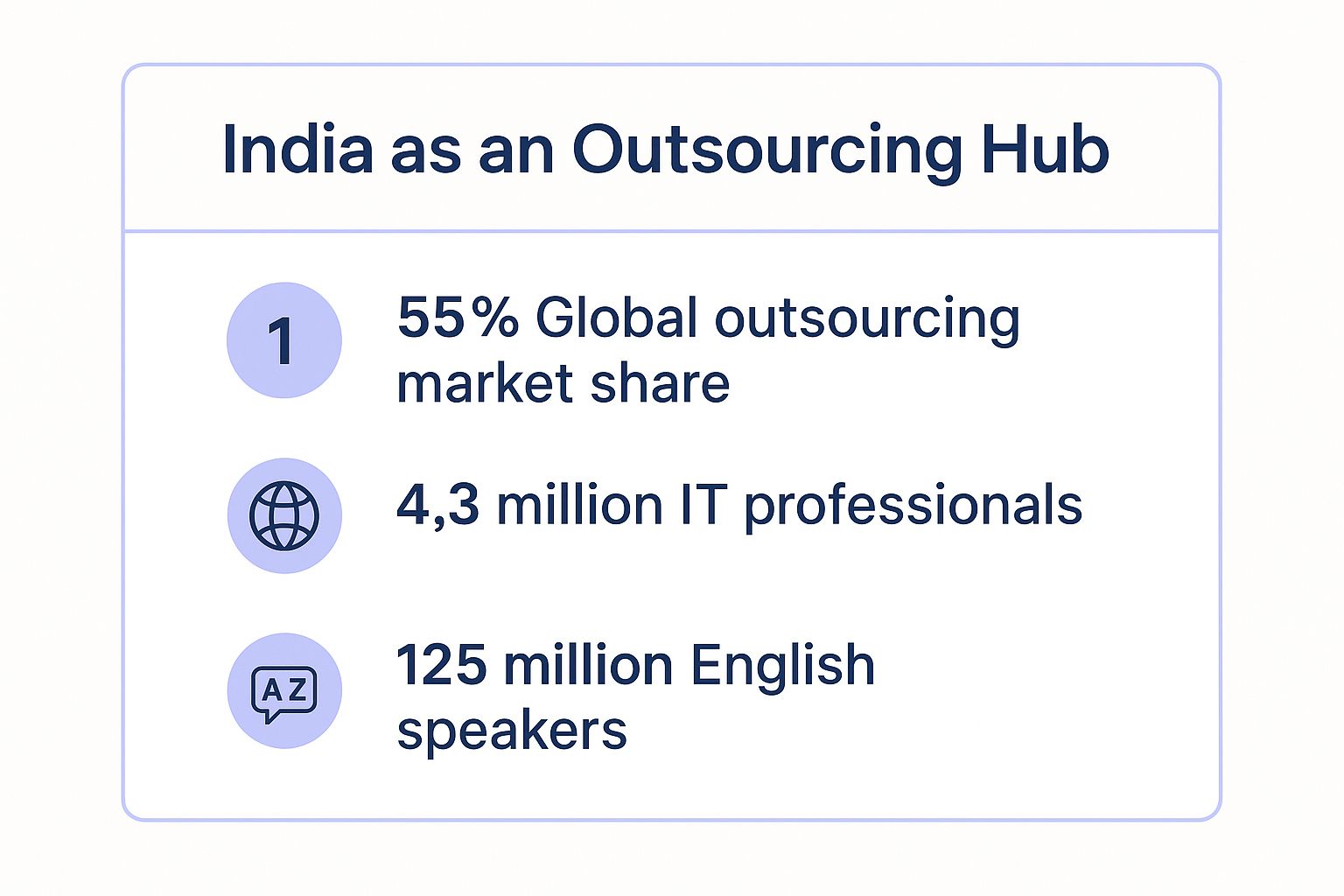
Choosing the right partner for outsourcing is one of the most critical strategic decisions a business can make. While cost reduction remains a primary driver, the modern approach to global talent acquisition has evolved significantly. It’s no longer just about finding the cheapest labor; it's about accessing specialized skills, accelerating time-to-market, and building resilient, scalable operations. The right outsourcing destination can provide a competitive edge that goes far beyond the balance sheet, unlocking innovation and driving growth. This shift is powered by technologies that enable seamless global collaboration, fundamentally changing how remote and hybrid teams are shaping the future of work.
This guide is designed to move past generic advice and provide a comprehensive analysis of the best countries for outsourcing today. We'll offer an in-depth look at the top contenders, arming you with the actionable insights needed to make an informed choice for your specific needs, whether you're a tech startup seeking developers or an enterprise company scaling its support functions.
We will break down each country based on a consistent set of crucial metrics:
By the end of this article, you will have a clear, comparative framework to identify which country offers the optimal blend of talent, cost-efficiency, and strategic alignment to help your business thrive.
Dominating the global stage, India is arguably the most recognized name when it comes to finding the best countries for outsourcing. It commands an estimated 55% of the global outsourcing market, making it the undisputed leader. This dominance is built on a foundation of a vast, highly skilled, and English-proficient workforce, particularly in the IT and business process sectors.
For decades, giants like Microsoft, IBM, and General Electric have established massive R&D and delivery centers across the country. These operations handle everything from complex software engineering and global IT infrastructure management to critical financial services and customer support, proving India's capability to manage large-scale, mission-critical projects.
India's primary advantage is its immense talent pool. The country produces millions of STEM graduates annually, fueling a robust ecosystem of IT service providers ranging from multinational corporations like TCS, Infosys, and Wipro to thousands of specialized niche agencies. This competitive landscape drives innovation and offers businesses a wide array of choices for their specific needs.
To illustrate the scale of India's outsourcing prowess, here's a quick reference summarizing its key metrics.

These figures highlight a powerful combination of market leadership, deep technical talent, and extensive English language skills that solidify India's position as a top-tier outsourcing destination.
To leverage India’s outsourcing potential effectively, a strategic approach is crucial.
While often recognized as a manufacturing titan, China has rapidly evolved into a powerhouse for high-tech outsourcing, particularly in software development, IoT, and product engineering. As the world's second-largest economy, its advanced infrastructure, massive government investment in technology, and a deep talent pool make it one of the best countries for outsourcing complex projects that require scale and precision.
Global tech leaders have long leveraged China's capabilities. Apple's legendary manufacturing partnership with Foxconn is a prime example of its industrial might, while Tesla's Gigafactory in Shanghai showcases its efficiency in advanced manufacturing. Beyond hardware, companies like Microsoft and Volkswagen have established significant software development and R&D centers in Beijing and Shanghai, tapping into China’s growing pool of highly skilled engineers.
China's key advantage lies in its unique combination of manufacturing expertise and a rapidly growing IT services sector. The nation produces millions of STEM graduates annually, who are increasingly proficient in cutting-edge technologies like AI, machine learning, and mobile development. This allows businesses to co-locate their manufacturing and software development, streamlining the entire product lifecycle from concept to production. The government's strong support for tech innovation further enhances this ecosystem.
This dual-threat capability, combining hardware and software excellence, positions China as a unique destination for companies building integrated smart products.
Engaging with the Chinese market requires careful planning and a nuanced approach to maximize benefits and mitigate risks.
Hailed as the "BPO Capital of the World," the Philippines has carved out a powerful niche as a premier destination for customer-facing services and business process outsourcing. Its main strength lies in a workforce renowned for its exceptional English proficiency, strong cultural affinity with Western markets, and a deeply ingrained service-oriented mindset. This unique combination makes it one of the best countries for outsourcing, particularly for voice-based support.

Global giants have long recognized this potential. Companies like Accenture, Concentrix, and JP Morgan Chase operate extensive centers across the country, handling critical customer service, technical support, and back-office functions for a global clientele. These operations showcase the Philippines' capacity to deliver high-quality, empathetic customer experiences at scale.
The country’s primary advantage is its highly adaptable and loyal workforce. The Filipino culture places a high value on hospitality and problem-solving, which translates directly into superior customer service interactions. With a literacy rate of over 96% and a neutral English accent, agents from the Philippines are exceptionally effective at building rapport with customers from North America, Europe, and Australia.
This cultural alignment minimizes communication barriers that can hinder customer satisfaction. The BPO industry is also a major pillar of the national economy, supported by government initiatives and a robust educational focus on communication and IT skills, ensuring a sustainable talent pipeline for businesses looking to outsource.
To maximize the benefits of outsourcing to the Philippines, consider these strategic steps:
Despite geopolitical challenges, Ukraine has cemented its reputation as a powerhouse in the IT outsourcing world, particularly for high-complexity software engineering. It stands out as a premier destination for European and North American companies seeking deep technical expertise, especially in emerging technologies like AI, big data, and blockchain.
This reputation is built on a foundation of a strong technical education system and a resilient, highly skilled workforce. Global tech successes like Grammarly, which originated with a development team in Kyiv, and WhatsApp's acquisition of a Ukrainian startup, showcase the caliber of engineering talent available. Major tech companies, including Ring (an Amazon subsidiary) and formerly Skype, have leveraged Ukrainian development centers for critical product engineering, proving the country's capability for delivering innovative, world-class software.
Ukraine's key advantage is its concentration of high-end engineering talent. The country is home to over 285,000 IT professionals, with a strong focus on complex programming languages and advanced software architecture. This has created a thriving ecosystem of tech service providers, from large international firms like EPAM and Luxoft to thousands of specialized agencies and product companies.
This deep pool of expertise makes Ukraine one of the best countries for outsourcing complex technical projects that require more than just routine coding. Companies turn to Ukraine for its engineers' problem-solving skills, robust mathematical backgrounds, and proficiency in building sophisticated, scalable systems from the ground up. The country's IT sector has shown incredible resilience, adapting to challenges by implementing distributed team models and robust business continuity plans.
To effectively tap into Ukraine’s formidable IT talent, a strategic and mindful approach is essential.
Emerging as a European powerhouse, Poland has cemented its status as a top-tier destination for outsourcing, particularly for high-value services. Its strategic location in the heart of Europe, coupled with its status as the largest economy in Central Europe, makes it an ideal nearshore option for businesses targeting the European market. The country offers a potent mix of technical prowess, strong business ethics, and cultural affinity with Western nations.
Global corporations have taken notice, establishing significant operations across the country. IBM runs major service delivery centers in Krakow and Warsaw, Google operates a key engineering office in the capital, and financial giants like UBS and State Street have built extensive technology and shared services hubs in Krakow. These investments underscore Poland's capacity to handle complex, mission-critical functions for global leaders.
Poland's key advantage lies in its highly educated and multilingual workforce. The country boasts a strong educational system, producing a steady stream of skilled graduates in IT, finance, and engineering. Polish professionals are renowned for their technical expertise, problem-solving skills, and high proficiency in English and other European languages like German, French, and Spanish.
This talent is complemented by a stable economic environment and membership in the European Union, which ensures a familiar and secure regulatory framework. Companies like Capgemini and Accenture have large-scale operations, alongside homegrown giants like software firm Asseco and game developer CD Projekt, creating a vibrant and competitive tech ecosystem. This combination of talent, stability, and EU alignment makes Poland one of the best countries for outsourcing complex projects.
To effectively tap into Poland's outsourcing capabilities, a focused approach is essential.
Emerging as a powerhouse for nearshoring, Mexico offers a compelling value proposition for North American businesses. Its strategic location, shared time zones with the US, and strong cultural alignment make it an ideal choice for companies seeking real-time collaboration and streamlined logistics. This proximity significantly reduces travel time and costs, fostering closer working relationships compared to distant offshore locations.
Major international companies have recognized this advantage for years. Tech giants like Intel and Oracle have established significant design and development centers, while Honeywell runs a major engineering hub in Mexico City. The country's IT services sector is led by homegrown champions like Softtek, which provides sophisticated software development and IT support to a global clientele, proving Mexico's capacity for high-value work.
Mexico's key advantage lies in its blend of proximity and a rapidly growing, skilled talent pool. The nation is home to major tech hubs, particularly in Guadalajara, often dubbed the "Silicon Valley of Mexico," which cultivates a vibrant ecosystem of developers, engineers, and IT professionals. The strong emphasis on bilingual education (Spanish/English) in the professional workforce makes it one of the best countries for outsourcing services targeted at the US market.
This combination of geographical convenience and a capable workforce allows businesses to extend their teams seamlessly. You can find out more about sourcing developers in the region by exploring LATAM talent for software development projects on lathire.com.
To effectively tap into Mexico's outsourcing market, a targeted approach is essential.
As Latin America's economic powerhouse, Brazil has emerged as a formidable destination among the best countries for outsourcing, particularly for companies targeting the Lusophone (Portuguese-speaking) and Spanish-speaking markets. Its vast economy, growing tech infrastructure, and a large, culturally aligned talent pool make it an attractive nearshore option for North American businesses seeking to expand their global reach.

Global companies like IBM and Accenture have established significant delivery centers across Brazilian cities, leveraging local talent for IT services, software development, and business process outsourcing. Furthermore, homegrown giants like aerospace leader Embraer and major financial institutions such as Banco do Brasil showcase the country's deep expertise in complex engineering and secure financial technology. This robust ecosystem provides a solid foundation for businesses looking for reliable, high-value partners.
Brazil's key advantage is its massive and diverse domestic market, which has fostered a sophisticated service industry. The country boasts a strong talent pool in creative fields, financial services, and IT, with professionals who are often fluent in both Portuguese and Spanish, and increasingly, English. This multilingual capability is a significant asset for companies aiming to serve the broader Latin American region.
The time zone alignment with North America is another critical benefit, facilitating real-time collaboration and communication. This proximity helps teams work synchronously, resolving issues faster and fostering a more integrated operational dynamic. For insights on managing regional talent, you can learn more about the productivity of remote workers in LATAM.
To tap into Brazil's outsourcing potential, a focused strategy is essential.
Vietnam has rapidly emerged as a powerful contender among the best countries for outsourcing, especially in software development and high-tech manufacturing. Its swift ascent is fueled by a young, tech-savvy population, strong government support for the tech sector, and highly competitive labor costs, presenting a compelling alternative to more established outsourcing hubs.
Global giants have taken notice, establishing significant operations that highlight Vietnam's capabilities. Samsung operates its largest smartphone manufacturing facilities here, while Intel runs a massive assembly and test facility in Ho Chi Minh City. In the software realm, companies like Microsoft have fostered development partnerships, leveraging the country's growing pool of skilled engineers for complex projects.
Vietnam's key advantage lies in its potent combination of low costs and high-quality technical education. The government has prioritized STEM education, producing a workforce with strong analytical and engineering skills. This has created a dynamic ecosystem, particularly in cities like Ho Chi Minh City and Hanoi, which are now recognized as burgeoning innovation centers.
This focus on technology and education has made Vietnam a prime destination for businesses looking to scale technical operations without the high price tag of other markets. The country's stable political environment and commitment to economic growth further enhance its appeal as a reliable long-term outsourcing partner.
To effectively tap into Vietnam's growing talent pool, a focused approach is necessary.
Emerging as a European tech powerhouse, Romania offers a compelling blend of high-level technical skills, cultural proximity to Western Europe, and competitive operational costs. As a member of the European Union, it provides a stable and secure environment, making it one of the best countries for outsourcing, particularly for companies prioritizing data security and regulatory alignment under GDPR.
This combination of factors has attracted major technology players. Tech giants like Oracle, IBM, and Microsoft have established significant development and service delivery centers in Bucharest. Furthermore, Romania is the birthplace of UiPath, a global leader in Robotic Process Automation (RPA), which underscores the country's capacity for producing world-class innovation and specialized technical talent.
Romania's primary appeal lies in its highly proficient, multilingual talent pool, especially in software development, engineering, and IT support. The country boasts a strong tradition of technical education, resulting in a workforce with excellent problem-solving abilities and a high command of English, French, and German. This makes it an ideal nearshore location for European businesses.
The country’s IT sector is mature and sophisticated, capable of handling complex projects from enterprise software development to advanced cybersecurity. This technical depth, combined with EU membership benefits, creates a low-risk, high-value proposition for businesses looking to scale their operations efficiently.
To tap into Romania's outsourcing potential, companies should adopt a focused approach.
Emerging as a powerhouse in Latin America, Argentina has carved out a niche as one of the best countries for outsourcing high-value technology services. The nation is recognized for its highly educated, creative workforce and strong cultural alignment with North American and European markets, making it a prime destination for software development, creative design, and complex IT solutions.
This reputation is built on homegrown success stories and international trust. Tech giants like Globant, co-founded by Martin Migoya and Guibert Englebienne, and the e-commerce titan MercadoLibre, founded by Marcos Galperin, showcase the country's capacity for world-class innovation. Similarly, international players like IBM have established significant R&D centers in Buenos Aires, leveraging local talent for sophisticated projects.
Argentina's key advantage lies in the quality and creativity of its talent pool. The country boasts a high literacy rate and a strong emphasis on university education, producing skilled professionals in technology, engineering, and design. Its time zone (UTC-3) overlaps significantly with North American business hours, facilitating real-time collaboration that is difficult to achieve with Asian or Eastern European partners.
Furthermore, Argentinian professionals often have a high level of English proficiency and a deep understanding of Western business culture, which smooths communication and reduces the friction often found in cross-cultural collaborations. This combination of technical skill and cultural compatibility makes Argentina an ideal partner for client-facing roles and agile development projects requiring close teamwork.
To effectively tap into Argentina’s sophisticated talent market, businesses should adopt a targeted approach.
| Country | Implementation Complexity | Resource Requirements | Expected Outcomes | Ideal Use Cases | Key Advantages |
|---|---|---|---|---|---|
| India | Moderate to High | Large talent pool, mature infrastructure | Cost savings, scalable IT & BPO services | IT services, software, financial BPO | Cost-effective, skilled workforce, 24/7 ops |
| China | High | Massive manufacturing & STEM graduates | Large-scale manufacturing, advanced R&D | Manufacturing, electronics, software | Scale, tech infrastructure, proximity to Asia |
| Philippines | Low to Moderate | Strong English skills, service-oriented | High-quality customer support and BPO | Voice-based customer service, BPO | English proficiency, cultural affinity |
| Ukraine | High | Skilled developers, strong STEM education | High-quality software development | Complex IT projects, AI/ML, blockchain | Technical expertise, European time zone |
| Poland | Moderate to High | Skilled workforce, EU regulatory compliance | High-quality services, EU market access | Software, finance, shared services | EU membership, regulatory stability |
| Mexico | Moderate | Growing IT and manufacturing talent | Nearshoring benefits, bilingual services | Nearshore software, manufacturing | Time zone alignment, cultural compatibility |
| Brazil | Moderate | Large, diverse workforce | Regional services with financial expertise | IT, financial services, manufacturing | Large domestic market, bilingual workforce |
| Vietnam | Low to Moderate | Young workforce, growing IT sector | Competitive cost manufacturing & IT | Basic IT, manufacturing, electronics | Low costs, growing technical capabilities |
| Romania | Moderate | Skilled IT talent, EU membership | High-quality IT and BPO services | IT services, shared services, BPO | EU compliance, competitive costs |
| Argentina | Moderate | Educated workforce, cultural compatibility | Quality software development & innovation | Software development, fintech, digital | Cultural fit, skilled technical talent |
Navigating the global talent landscape to find the best countries for outsourcing can feel like an overwhelming task. As we've explored, destinations from the tech powerhouses of India and Poland to the burgeoning creative hubs in Brazil and Vietnam each offer a unique combination of cost-effectiveness, specialized skills, and cultural alignment. The "best" choice is never a one-size-fits-all answer; it's a strategic decision deeply rooted in your company's specific needs, long-term goals, and operational style.
Your journey doesn't end with a pin on the map. Choosing a country is merely the first step. The real success lies in how you integrate this global talent into your existing framework. A low-cost developer in Romania or a skilled support agent in the Philippines only provides value if they are onboarded, managed, and empowered effectively. The decision is less about finding the cheapest option and more about discovering the most valuable partnership for your business.
Moving from this comprehensive list to a confident decision requires a structured approach. Avoid analysis paralysis by breaking down the process into clear, manageable steps.
1. Internal Needs Assessment:
Before looking outward, look inward. What specific roles do you need to fill? Is this for a short-term project or a long-term team extension?
2. Create a "Top 3" Country Shortlist:
Based on your internal assessment, select your top three contenders. This focused list allows for deeper, more meaningful comparisons.
3. Conduct Pilot Projects or Trial Engagements:
The single most effective way to validate your choice is to start small. Before committing to hiring a full team, engage one or two professionals from your top-choice countries for a limited-scope project.
Ultimately, identifying the best countries for outsourcing is only half the battle. The true differentiator between a frustrating, failed experiment and a high-performing global team is the quality of your hiring and integration process. Selecting a country gives you access to a talent pool, but your recruitment strategy is what secures the top performers within it. Understanding the nuances of interviewing, vetting, and onboarding remote professionals is a critical skill set. Beyond selecting the right country, understanding the expert tips for hiring remote software developers is crucial for building a truly effective global team.
The world is rich with talent, and modern technology has dissolved the geographical barriers that once confined businesses. By leveraging the unique strengths of global talent hubs, you can build a more resilient, innovative, and efficient organization. The key is to approach outsourcing not as a simple cost-cutting measure, but as a strategic initiative to build a diverse, world-class team. Start with a clear plan, validate your choices with real-world tests, and invest in the processes that will turn your global workforce into a powerful competitive advantage.
